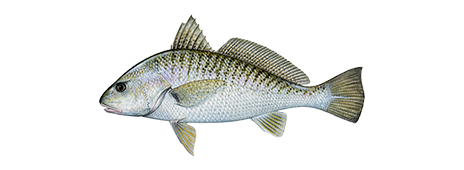
Atlantic Croaker
The name ‘croaker’ is derived from the croaking noise that these fish make by vibrating their swim bladders.

Region
South, Northeast
Catch ease
Easy
Habitat
Bay, Ocean
How to identify an Atlantic Croaker
Atlantic croaker average about 12 inches in length and weigh up to four pound with the average fish weighing around two pounds. The distinguishing characteristics of the croaker include three to five pairs of small barbels on their chins to help them feel for food on the sea floor. They have a lateral line that extends to the tip of their tail fin and have a downward facing, sub-terminal mouth. Most croakers will have brown to olive vertical stripes on their sides. Adult specimens will typically have a pinkish to silver cast while younger fish are silvery and iridescent. The name ‘croaker’ is derived from the croaking noise that these fish make by vibrating their swim bladders with special muscles as part of their annual spawning rituals. During spawning season, females will release between 150,000 and 2 million eggs. After hatching, these larval fish will remain very near shore while they feed on detritus.
Where to catch Atlantic Croaker
Atlantic croaker are one of the most abundant fishes in North American coastal waters and can be found on the Atlantic coast from Massachusetts southward throughout the Gulf of Mexico. It is an important commercial fish as well as an important sport fish throughout its range. They prefer estuaries and bays through the spring and summer months, then travel offshore in the fall to breed. The following list includes additional details on where to catch this fish:
| Bays and Estuaries |
| Channel Entrances |
| Deep Shore Water |
| Man-Made Structures |
| Night Fishing |
| Reefs, Wrecks, and Shoals |
| Shore Points |
| Breakers |
| Coastal Waters |
| Jetties and Breakwaters |
| Merging Water |
| Piers, Docks and Pilings |
| Saltwater and Tides |
| Surf and Shore |
how to catch Atlantic Croaker
A highly sought after species, the croaker can be easily taken from shore, boat, dock or pier using natural baits such as shrimp, clams and squid as well as artificial baits such as jigs and spoons. Croakers make for excellent table fare and are often cooked whole as panfish. The following are fishing methods used to catch this fish:
Atlantic Croaker lures, tackle & bait
The following are lures, tackle or bait that can be used to catch this fish:
